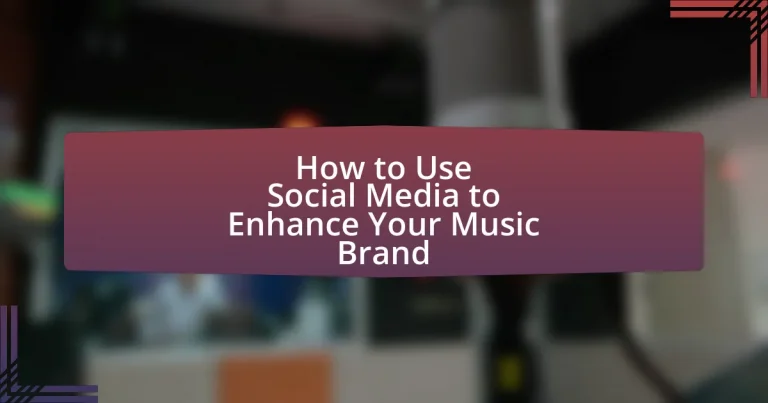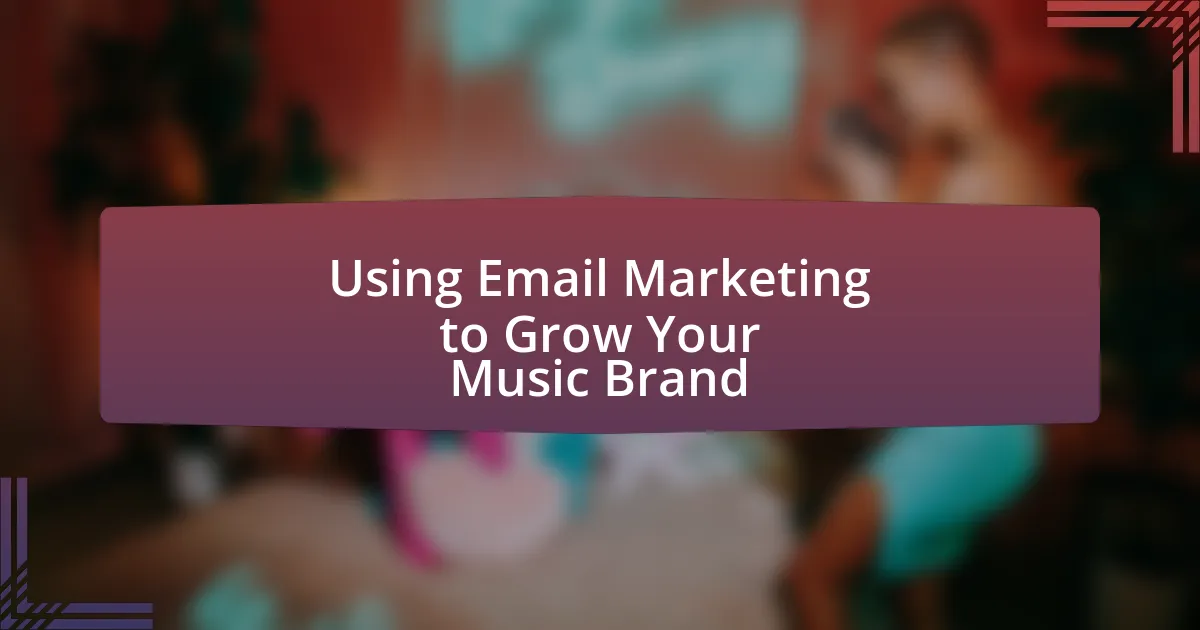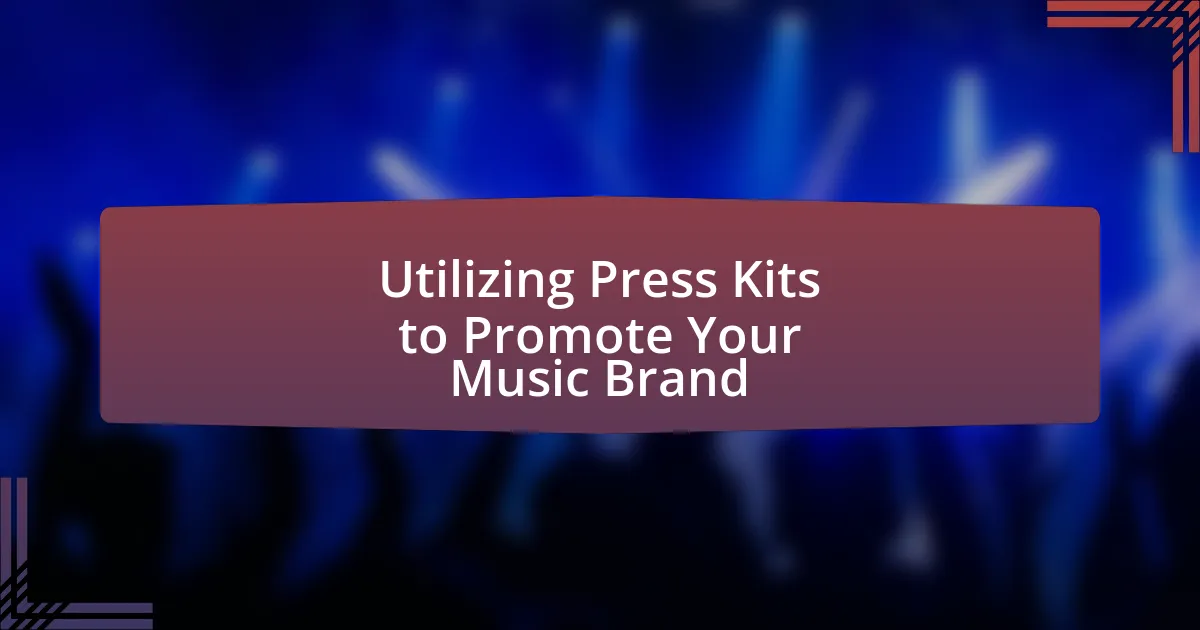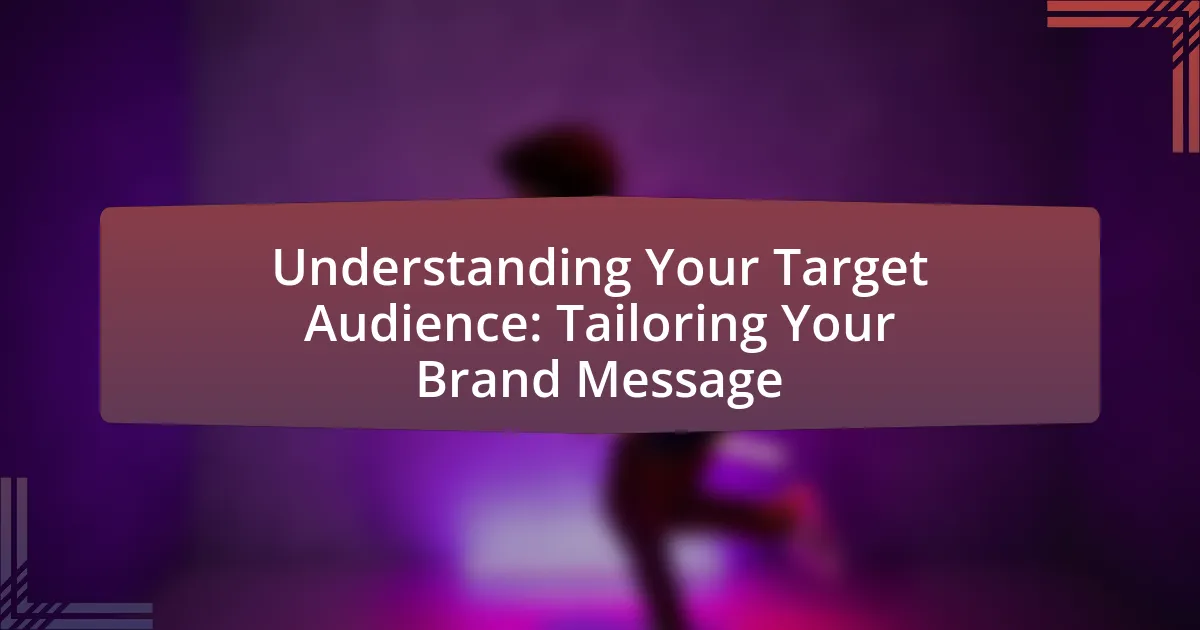The article focuses on the role of social media in enhancing a music brand, emphasizing its importance for direct fan engagement and music promotion. It outlines how musicians can effectively utilize platforms like Instagram, TikTok, and YouTube to share content, interact with fans, and build a loyal community. Key strategies for musicians include consistent posting, targeted advertising, and collaboration with influencers, while also highlighting the significance of branding and visual identity. Additionally, the article discusses metrics for measuring social media success and common pitfalls to avoid, providing a comprehensive guide for musicians looking to strengthen their online presence.
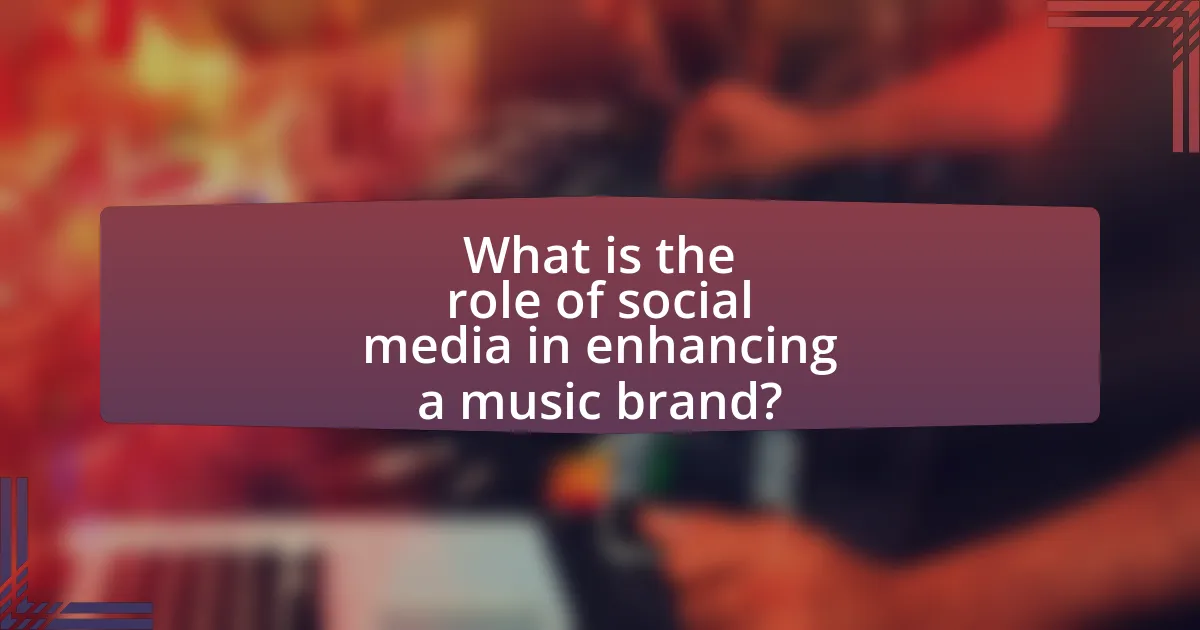
What is the role of social media in enhancing a music brand?
Social media plays a crucial role in enhancing a music brand by providing a platform for direct engagement with fans and promoting music content. Through channels like Instagram, Twitter, and TikTok, artists can share updates, behind-the-scenes content, and interact with their audience, fostering a sense of community. According to a 2021 report by the International Federation of the Phonographic Industry, 75% of music consumers discover new music through social media platforms, highlighting their effectiveness in reaching potential listeners. Additionally, social media allows for targeted advertising, enabling music brands to reach specific demographics and increase their visibility in a competitive market.
How can social media platforms be utilized by musicians?
Musicians can utilize social media platforms to promote their music, engage with fans, and build their brand. By sharing content such as music videos, behind-the-scenes footage, and live performances, musicians can increase their visibility and connect with a wider audience. For instance, platforms like Instagram and TikTok allow musicians to create short, engaging clips that can go viral, reaching millions of potential listeners. Additionally, musicians can use social media for direct interaction with fans through comments, live streams, and Q&A sessions, fostering a loyal community. According to a 2021 report by the International Federation of the Phonographic Industry, 70% of music consumers discover new music through social media, highlighting its effectiveness as a promotional tool.
What are the key social media platforms for musicians?
The key social media platforms for musicians are Instagram, Facebook, TikTok, Twitter, and YouTube. Instagram is widely used for sharing visual content and engaging with fans through stories and posts, making it essential for brand building. Facebook allows musicians to create pages, share events, and connect with a broader audience. TikTok has rapidly gained popularity for its short-form video content, enabling musicians to reach viral status through creative challenges and trends. Twitter serves as a platform for real-time updates and direct interaction with fans. YouTube remains crucial for music videos and long-form content, providing a space for artists to showcase their work and connect with audiences globally. These platforms collectively enhance a musician’s brand presence and audience engagement.
How do different platforms cater to various music genres?
Different platforms cater to various music genres by tailoring their features, algorithms, and user engagement strategies to specific audience preferences. For instance, Spotify utilizes curated playlists and genre-specific radio stations to promote diverse music styles, while SoundCloud allows independent artists to upload and share niche genres, fostering community engagement around those styles. Additionally, YouTube’s algorithm promotes music videos based on genre popularity and user interaction, enabling artists to reach targeted audiences effectively. These strategies demonstrate how platforms adapt to the unique characteristics of different music genres, enhancing visibility and engagement for artists within those categories.
Why is social media important for music branding?
Social media is important for music branding because it provides artists with a direct platform to engage with their audience and build a loyal fan base. This engagement allows musicians to share their music, promote events, and create a personal connection with fans, which is essential for brand loyalty. According to a 2021 report by the International Federation of the Phonographic Industry, 80% of music consumers discover new music through social media platforms, highlighting their role in shaping music branding.
What impact does social media have on audience engagement?
Social media significantly enhances audience engagement by facilitating direct interaction between artists and their fans. This platform allows musicians to share content, receive immediate feedback, and foster a sense of community. According to a study by the Pew Research Center, 69% of adults in the U.S. use social media, which indicates a vast audience potential for artists to connect with. Furthermore, brands that actively engage with their audience on social media see a 20-40% increase in customer engagement, demonstrating the effectiveness of these platforms in building relationships and loyalty.
How does social media influence music discovery?
Social media significantly influences music discovery by providing platforms for artists to share their work and engage with audiences directly. These platforms, such as Instagram, TikTok, and Twitter, allow musicians to promote their music through posts, videos, and live streams, reaching a global audience instantly. According to a 2021 report by the International Federation of the Phonographic Industry, 75% of music listeners discover new music through social media platforms. This statistic underscores the critical role social media plays in shaping music trends and listener preferences, as algorithms on these platforms often promote content based on user interactions, further enhancing visibility for emerging artists.
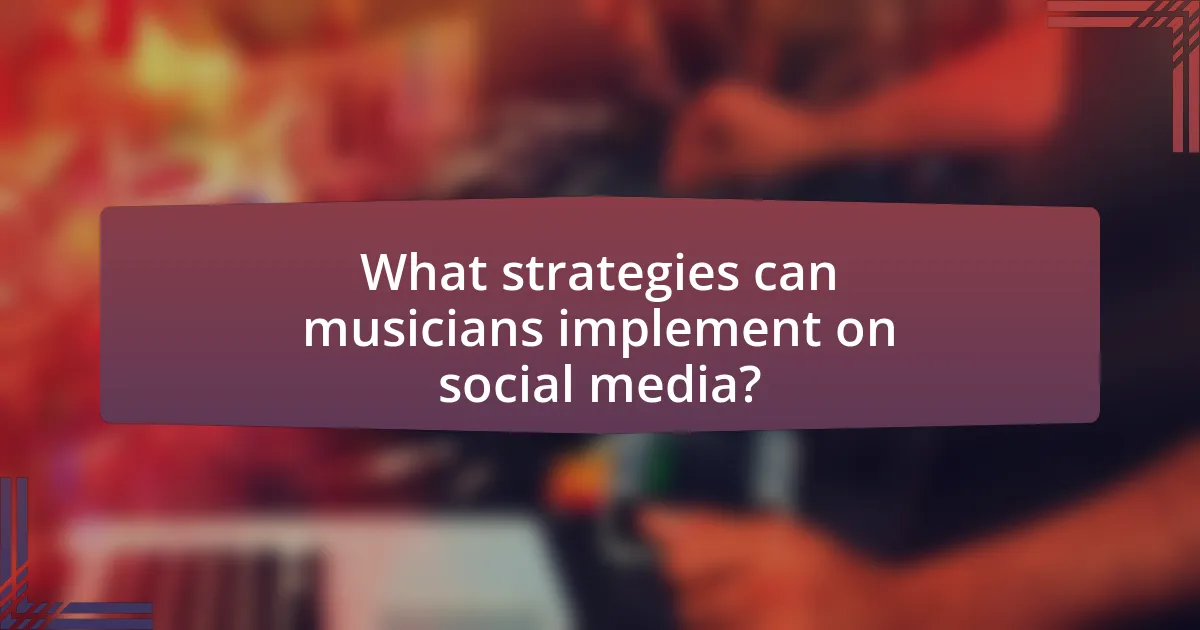
What strategies can musicians implement on social media?
Musicians can implement several effective strategies on social media to enhance their music brand. First, they should engage with their audience through regular posts, live sessions, and Q&A sessions, fostering a sense of community and connection. Research indicates that brands that actively engage with their audience see a 20-40% increase in customer loyalty. Additionally, musicians can utilize targeted advertising to reach specific demographics, which can increase their visibility and fan base. According to a study by Hootsuite, social media ads can yield a return on investment of up to 400%. Collaborating with other artists and influencers can also expand their reach, as partnerships often lead to cross-promotion and access to new audiences. Lastly, sharing behind-the-scenes content and personal stories can humanize the artist, making them more relatable and memorable to fans.
How can musicians create engaging content on social media?
Musicians can create engaging content on social media by sharing behind-the-scenes footage, live performances, and personal stories that resonate with their audience. This approach fosters a deeper connection with fans, as it allows them to see the creative process and the artist’s personality. For instance, a study by the Pew Research Center found that 69% of adults use social media, making it a vital platform for musicians to reach and engage with a broad audience. Additionally, utilizing interactive features like polls, Q&A sessions, and challenges can further enhance engagement, as these elements encourage audience participation and feedback.
What types of content resonate most with music fans?
Music fans resonate most with authentic and engaging content, such as behind-the-scenes footage, live performances, and personal stories from artists. Research indicates that 70% of fans prefer content that offers a glimpse into the artist’s life and creative process, fostering a deeper connection. Additionally, interactive content like polls, Q&A sessions, and fan challenges significantly boosts engagement, as fans appreciate opportunities to participate and express their opinions.
How often should musicians post on social media?
Musicians should post on social media at least 3 to 5 times per week to maintain engagement with their audience. This frequency helps to keep followers informed and interested in their music and activities. Research indicates that consistent posting can lead to increased visibility and interaction; for instance, a study by HubSpot found that brands that post 16 times per month receive 3.5 times more engagement than those that post less frequently. Therefore, a regular posting schedule is essential for musicians aiming to enhance their music brand through social media.
What role does branding play in a musician’s social media presence?
Branding is crucial in a musician’s social media presence as it establishes identity and fosters audience connection. A strong brand helps musicians differentiate themselves in a saturated market, allowing them to convey their unique style, values, and message effectively. For instance, artists like Taylor Swift and Billie Eilish utilize consistent visual aesthetics and messaging across platforms to reinforce their brand identity, which enhances fan loyalty and engagement. Research indicates that musicians with a well-defined brand can increase their social media following by up to 30%, demonstrating the direct impact of branding on audience growth and interaction.
How can musicians develop a consistent brand voice online?
Musicians can develop a consistent brand voice online by defining their unique identity and message, then consistently communicating that across all platforms. This involves creating a clear mission statement that reflects their values and musical style, which should be evident in their posts, visuals, and interactions. For instance, artists like Taylor Swift maintain a consistent voice by aligning their social media content with their personal brand narrative, ensuring that their messaging resonates with their audience. Consistency in tone, style, and content across platforms fosters recognition and trust, which are crucial for building a loyal fanbase.
What visual elements are essential for a strong music brand on social media?
A strong music brand on social media requires cohesive visual elements such as a distinctive logo, consistent color palette, engaging imagery, and professional cover art. These elements create a recognizable identity that resonates with audiences. For instance, a distinctive logo helps in brand recall, while a consistent color palette enhances visual harmony across platforms. Engaging imagery, including high-quality photos and videos, captures attention and conveys the artist’s personality. Professional cover art is crucial for music releases, as it serves as the first impression for potential listeners. Research indicates that brands with consistent visual identity can increase revenue by up to 23%, highlighting the importance of these visual elements in establishing a strong music brand on social media.
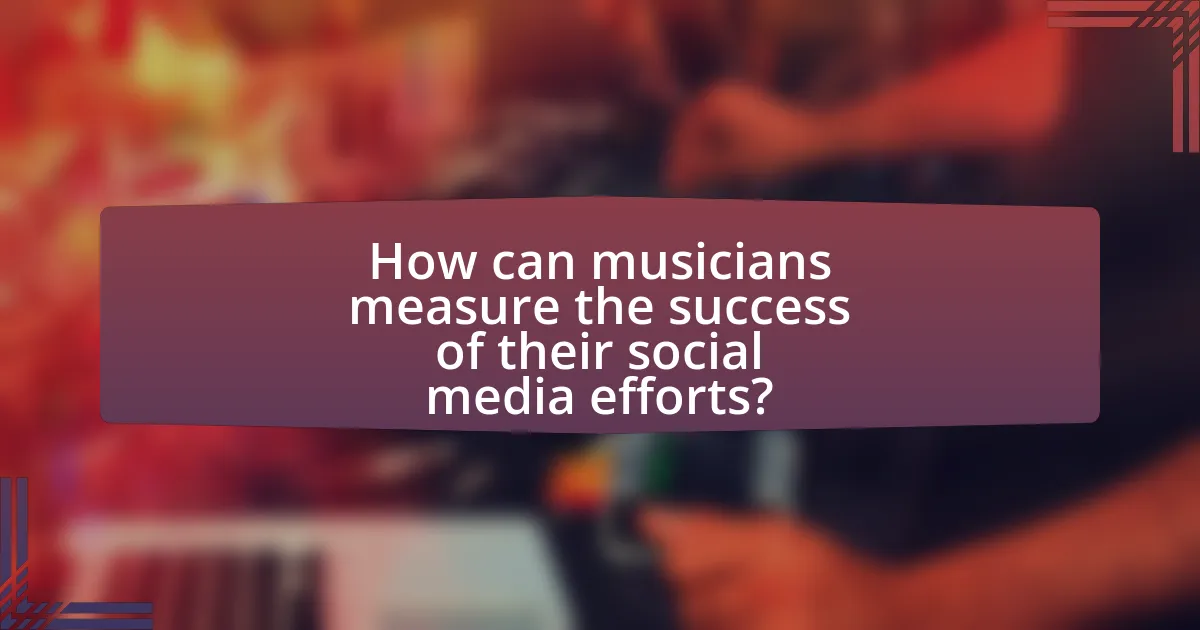
How can musicians measure the success of their social media efforts?
Musicians can measure the success of their social media efforts by analyzing key performance indicators (KPIs) such as engagement rates, follower growth, and conversion metrics. Engagement rates, which include likes, shares, and comments, indicate how well the audience interacts with the content, while follower growth shows the increase in audience size over time. Conversion metrics, such as the number of streams, downloads, or ticket sales generated from social media campaigns, provide insight into the effectiveness of promotional efforts. According to a study by Hootsuite, posts with higher engagement rates can lead to a 50% increase in audience reach, demonstrating the importance of these metrics in assessing social media success for musicians.
What metrics should musicians track on social media?
Musicians should track engagement metrics, follower growth, reach, and conversion rates on social media. Engagement metrics, such as likes, shares, and comments, indicate how well content resonates with the audience. Follower growth measures the increase in audience size, which is crucial for expanding reach. Reach quantifies how many unique users see posts, providing insight into visibility. Conversion rates track actions taken by users, such as clicking links to music platforms or signing up for newsletters, reflecting the effectiveness of social media efforts. These metrics collectively help musicians assess their social media performance and refine their strategies for brand enhancement.
How can engagement rates inform a musician’s strategy?
Engagement rates can inform a musician’s strategy by providing insights into audience preferences and content effectiveness. High engagement rates indicate that the audience resonates with the musician’s content, allowing the musician to tailor future posts to maintain or increase interest. For instance, if a musician notices that videos receive more likes and shares than static images, they can prioritize video content to enhance audience interaction. Additionally, analyzing engagement metrics can help identify the best times to post, optimize content types, and refine messaging, ultimately leading to a more effective social media strategy that aligns with audience expectations.
What tools are available for tracking social media performance?
Tools available for tracking social media performance include Hootsuite, Sprout Social, Buffer, and Google Analytics. Hootsuite allows users to monitor multiple social media accounts and analyze engagement metrics, while Sprout Social provides in-depth reporting and social listening features. Buffer focuses on scheduling posts and offers analytics on post performance. Google Analytics can track traffic from social media platforms to websites, providing insights into user behavior. These tools are widely used in the industry, with Hootsuite serving over 18 million users and Sprout Social recognized for its comprehensive analytics capabilities.
How can feedback from social media shape a musician’s brand?
Feedback from social media can significantly shape a musician’s brand by providing real-time insights into audience preferences and engagement levels. Musicians can analyze comments, likes, and shares to understand what resonates with their fans, allowing them to tailor their music, image, and marketing strategies accordingly. For instance, a study by the Pew Research Center found that 72% of adults use social media, indicating a vast audience for musicians to engage with and receive feedback from. This feedback loop enables musicians to refine their artistic direction and strengthen their connection with fans, ultimately enhancing their brand identity and marketability.
What are effective ways to gather audience feedback on social media?
Effective ways to gather audience feedback on social media include utilizing polls, surveys, and direct engagement through comments and messages. Polls and surveys can be created using platforms like Instagram Stories or Twitter, allowing users to quickly express their opinions on specific topics. Direct engagement, such as responding to comments or asking open-ended questions in posts, encourages followers to share their thoughts and experiences. Research indicates that interactive content, like polls, can increase engagement rates by up to 20%, demonstrating its effectiveness in collecting feedback.
How can musicians adapt their strategies based on audience insights?
Musicians can adapt their strategies based on audience insights by analyzing data from social media interactions, streaming platforms, and audience demographics. By leveraging analytics tools, musicians can identify which songs resonate most with their audience, allowing them to tailor their setlists and promotional efforts accordingly. For instance, a study by Nielsen Music found that 70% of listeners prefer artists who engage with them on social media, indicating that personalized communication can enhance fan loyalty. Additionally, understanding audience preferences can guide musicians in selecting the right platforms for promotion, optimizing content types, and timing for releases, ultimately leading to more effective marketing strategies.
What are some best practices for musicians using social media?
Musicians should engage consistently with their audience on social media to build a strong online presence. Regular posting, responding to comments, and sharing behind-the-scenes content fosters community and loyalty among fans. According to a study by the Pew Research Center, 69% of adults in the U.S. use social media, highlighting its importance for reaching a broad audience. Additionally, utilizing analytics tools to track engagement metrics allows musicians to refine their strategies based on what resonates with their followers. This data-driven approach ensures that content remains relevant and engaging, ultimately enhancing the musician’s brand.
How can musicians effectively collaborate with influencers on social media?
Musicians can effectively collaborate with influencers on social media by identifying influencers whose audience aligns with their music genre and brand values. This targeted approach ensures that the collaboration reaches potential fans who are genuinely interested in the musician’s work. For instance, a study by the Influencer Marketing Hub found that 63% of marketers believe that influencer partnerships can significantly enhance brand awareness. By creating engaging content together, such as behind-the-scenes videos, live performances, or exclusive interviews, musicians can leverage the influencer’s reach to amplify their visibility. Additionally, offering exclusive content or experiences to the influencer’s audience can foster a sense of community and encourage engagement, further solidifying the collaboration’s impact.
What common mistakes should musicians avoid on social media?
Musicians should avoid oversharing personal content on social media, as it can dilute their professional image and alienate their audience. Maintaining a balance between personal and professional posts is crucial; excessive personal content can lead to followers disengaging. Additionally, musicians should refrain from neglecting engagement with their audience, as responding to comments and messages fosters community and loyalty. Ignoring this interaction can result in a loss of connection with fans. Another mistake is inconsistent branding across platforms, which can confuse followers about the musician’s identity and message. Consistency in visuals and messaging strengthens brand recognition. Lastly, musicians should avoid posting low-quality content, as it can negatively impact their perceived professionalism and artistry. High-quality visuals and sound are essential for maintaining a strong online presence.
